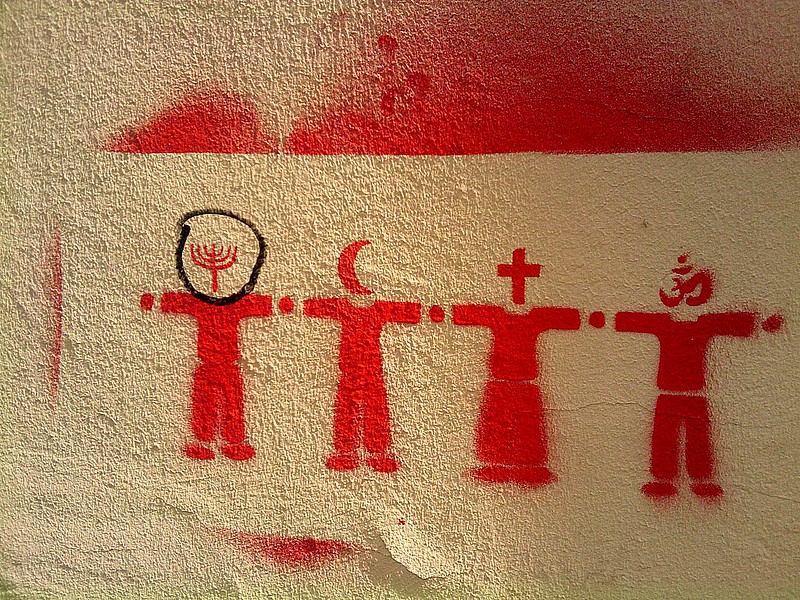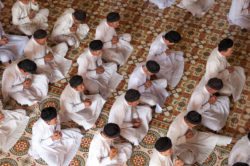Religions and COVID-19: Virulent Resistance and Virtuous Accommodation
Written by Dr Abel Ugba

Religion stencil (image credit: murdelta, Flickr/Creative Commons)
In this post Dr Abel Ugba analyses the responses of religious groups to COVID-19 restrictions. He concludes that religion remains connected to various aspects of our postmodern society and it is still a potent force for rallying social solidarity and instigating conflicts and conformity.
Religion, thanks to the COVID-19 pandemic, is no longer the ‘greatest story never told…or told very well’, as Judith Buddenbaum describes it in Reporting News about Religion. It has received an unprecedented surge in media coverage and public attention, especially since the epidemic transformed into a pandemic. The multifaceted nature of the media scrutiny demonstrates that religion connects to nearly every sector of our postmodern and increasingly secular society - a connection that fervent atheists take a great pleasure in denying and diminishing. The renewed attention also demonstrates that religion is still the complex phenomenon that sociologists and analysts from several disciplines have for centuries struggled to untangle. This complexity is radiantly showcased both in how religions have responded to COVID-19 restrictions, and in the intricate manoeuvres by governments to implement these restrictions and, at the same time, respect religious sensibilities and freedoms.
Religious groups have resisted COVID-19 restrictions virulently in some places and extended a virtuous accommodation in other places. This short piece speculates on the motivations for the divergent, and at times inconsistent, responses and what they reveal about the relationship between religion and the state in postmodernity. Simply pluralising ‘religion’ by adding an ‘s’ to indicate its multiple-ness and varieties could never capture the differences and complexities inherent in religion. But I am also not sure what could. Therefore, this article focuses on selected developments within specific religions in the US, Nigeria and India. The conclusions cannot in any way be generalised to other religions, even those within the same geo-political space or the same religion in a different geo-political space.
The US seems to be the right place to start because it occupies a centre place among the most religious and religiously diverse nations. The arrest of Rodney Howard-Browne, an evangelical pastor and co-founder of the Florida-based The River at Tampa Bay Church, for purposely flouting the stay-at-home orders has triggered a mighty row about freedom of religion in that country. After he presided over two services that were attended by hundreds of worshippers, Howard-Browne was arrested on March 30 and charged with organising an unlawful assembly in defiance of the public health emergency rules. The conservative religious liberty group, Liberty Counsel, quickly opted to represent him – a move that has divided the evangelical community and raised questions about limits to constitutionally guaranteed freedoms. One side of the evangelical community has insisted that its inalienable right to practise the faith must not be interrupted, even by a pandemic as deadly as COVID-19. The other side argues that a public health emergency requires that anything, including constitutionally guaranteed freedoms, can be altered in the interest of society and to protect God-given lives.
The wrangles have since expanded and they have closely mirrored the complex and politicised contours of the religious landscape in the US. Religious and legal justifications have been increasingly mixed with politics, as die-hard evangelical supporters of President Donald Trump linked the calls to shut down places of worship and sectors of the economy to the opponents’ efforts to thwart the re-election of the man they claim is God’s instrument to restore Christian beliefs and values in America. It is a fight that is likely to get messier and bloodier as the pandemic and the campaign for the November elections coincide.
But voices of reason and accommodation have spoken up. For example, Maggie Siddiqi who speaks on behalf of the Centre for American Progress on faith matters, has warned that states that are not enforcing social isolation measures among religious group are putting the public at risk: “Viruses do not discriminate on gatherings based on whether they are religious or not…Our public health response should be bans on gatherings whether they are religious are not.” Similarly, bigger and more affluent religious groups have rallied round smaller and weaker ones by offering financial succour.
In Nigeria, Africa’s most populous nation and one of its most religious, prominent Pentecostal pastors, or ‘big men of God’ as they are honorifically described in the local parlance, have championed the resistance to the COVID-19 measures. Soon after the government gave the order to lock down Lagos, the nation’s commercial hub and the political capital Abuja, the leader of the multi-nations Christ Embassy, Mr Chris Oyakhilome, accused the government of concocting a ruse so it could lay 5G cables in both places. He trumpeted the roundly discredited link between 5G and COVID-19 and ascribed evil motives to the government. Mr David Oyedepo, another Pentecostal leader with thousands of followers, also railed against the government, and implied that the COVID-19 rules were surreptitiously aimed at stemming Christianity in the country.

Mosque Book, National Mosque in Abuja, Nigeria. The mosque was built in 1984 and one of the chief religious sites in the capital (image credit: Mark Fischer, Flickr/Creative Commons)
In truth, the seed of discord between the present government and sections of the Nigerian Christian community was planted not during COVID-19, but in the 2015 elections that replaced a Christian from the south with a Muslim from the north as President. Some Christian leaders accused the winner of that election and current President, Mr Muhammadu Buhari, of harbouring an agenda to Islamise Nigeria – a wholly unsubstantiated allegation that persisted even after he opted for a Christian vice-president and appointed Christians to several cabinet positions. COVID-19 has merely provided another platform for sections of mostly Nigerian Pentecostal Christians to continue their resistance to a government they have always detested. It has laid bare the intricate links between religion and politics in African’s largest democracy.
But virulent opposition has also been mixed with virtuous accommodation in this nation of close to 200 million people with almost equal number of Christians and Muslims. In April, the Deeper Christian Life Ministry led by a former university lecturer, Mr Williams Kumuyi, donated 50 million naira (about US$130,000) to the government to fight the coronavirus. Mr Kumuyi praised the Nigerian government, stating that the organisation he represents has been “delighted at and challenged by the massive efforts of the Federal Government and her agencies in curtailing the spread of COVID-19 and bringing relief to sufferers.”
Minority religions, particularly Islam, have borne the brunt of COVID-19 in India, one of the most religiously diverse countries in the world. The nearly 200 million Muslims in the country have had an uneasy relationship with the majority Hindus in the best of times, but hostility and harassments, which intensified after the Hindu nationalist government of Prime Minister Narendra Modi ascended to power, have climaxed during COVID-19. Reports on social media and other media outlets detail attacks on Muslims, especially after the Tablighi Jamaat missionary group organised an assembly of about 2500 Muslims from different parts of the country allegedly without putting in place measures against COVID-19.

Prayer (image credit: Wagner T. Cassimiro "Aranha", Flickr/Creative Commons)
But even in the minority scape-goating environment in India, evidence of virtuous accommodation abounds. The Organisation of Islamic Cooperation has called for cooperation in a situation “where Indian Muslim minority is blamed of spreading the coronavirus in the country.” Prime Minister Modi has preached harmony and cooperation in a tweet to his 56.8 million followers on April 19: “COVID-19 does not see race, religion, colour, caste, creed, language or borders before striking. Our response and conduct thereafter should attach primacy to unity and brotherhood. We are in this together.”
During the COVID-19 pandemic Religion has remained a complex but potent force for rallying social solidarity, as Emile Durkheim argued centuries ago, the instigator of societal conflicts as conflict theorists describe it, and the enabler of resistance and conformity that Marxist analysts assert it is.
Dr Abel Ugba is a sociologist of religion and a media scholar. He teaches in the School of Sociology and Social Policy at the University of Leeds. He can be reached at: a.f.ugba@leeds.ac.uk
Author
Dr Abel Ugba
Teaching Fellow in Sociology
